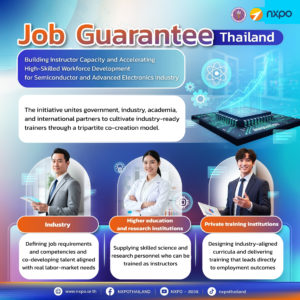
The Annual Report 2021 released by the National Higher Education, Science, Research and Innovation Policy Council (Policy Council) contained the analysis of science, research and innovation (SRI) capability in 15 sectors. This article presents SRI current capability and areas of development in artificial intelligence, advanced materials, quantum technology, earth space system and social sciences, humanities and arts.
Artificial Intelligence (AI)
The rapid development of artificial intelligence (AI) has benefited multiple areas as the world is currently driven by data and technology. AI market is expected to reach THB 114 billion in 2030 and its application will grow to 50%, up from 17% in 2019.
Current Capability. The 2020 edition of the Government Artificial Intelligence (AI) Readiness Index published by Oxford Insights placed Thailand at the 60th position among 172 countries, and 7th among 15 Asian countries. Thailand had strong advantage in data, performed moderately in education, skill and innovation, while its policy and governance needed much improvement. Progress has been made in AI research and development in Thai academic and research institutes with some innovations having been put to good use in both the public and private sectors.
Areas of Development. Thailand needs to build a critical mass of high skilled personnel and develop AI education in order to be at the forefront of AI development. Data availability and infrastructure as well as sandboxes will greatly enhance the AI development.
Advanced Materials
Advanced materials with novel properties or high-performance characteristics are increasingly sought after by all industries. Their development therefore has high potential to make a considerable impact to the economy.
Current Capability.
Advanced materials are increasingly finding their way into electronic devices, automobiles, polymers, batteries, electric vehicles, robots, medical equipment and others. There is an active research on agriculture waste-derived carbon nanomaterials, and some already developed technologies such as bioplastic production technology using a biomass-derived catalyst. Innovation in advanced ceramics and magnetic materials will enhance the competitiveness of Thailand’s electronic industry as the country is the major producer of HDDs, integrated circuits, capacitors, diode, transistors and multilayer PCB.
Areas of Development. As advanced materials are drivers of all 12 new S-curve industries of Thailand, their research should be put into a basic platform to enable the new economy and sustainable development.
Quantum Technology
Quantum technology holds promise to enhance the computing, processing, coding, transmitting and storing capabilities of large volumes of data. The technology is crucial for the economic development and national security.
Current Capability. The work in quantum technology in Thailand concentrates in three areas: quantum computing and simulation, quantum communication, and quantum metrology and sensing. Thailand has potential to become a leader in quantum technology due to a sizable number of young Thai scientists who received training from world-class universities and government funding dedicated to quantum technology and global partnership.
Areas of Development. Manpower development and public awareness are key areas that should be promoted. A report on Quantum Technology Roadmap 2020-2029 published by NXPO in collaboration with the scientific community can serve as a framework for quantum technology development in Thailand.
Earth Space System
Space technology can benefit the earth and humanities in several ways. Satellites – part of space technology – support communication, earth observation, weather forecast, etc. The technology is important to the economy with growing commercial applications, such as space tourism, satellite internet service and commercial satellite data.
Current Capability. Thailand relies heavily on foreign technology when it comes to space technology. Satellites used in Thailand were built by foreign companies. There was Thaipat microsatellite designed and built by Thai engineers under the collaboration with the University of Surrey. Due to lack of funding, not much has been done to promote research and manpower development in space technology.
Areas of Development. Manpower development, public awareness and infrastructure development are key areas that should be promoted so that Thailand can reap the benefits of this technology in solving problems such as natural disasters and strengthening the new economy.
Social Sciences, Humanities and Arts (SHA)
Thailand’s recent system reform in science and higher education has led to the close examination of SHA research system. NXPO in collaboration with experts in various fields has conducted SHA systems research and published a white paper detailing future setting, blueprint and recommendations. In addition, Thailand Academy of Social Sciences, Humanities and Arts (TASSHA) was recently established to drive knowledge creation and manpower development in social sciences, humanities and arts.







